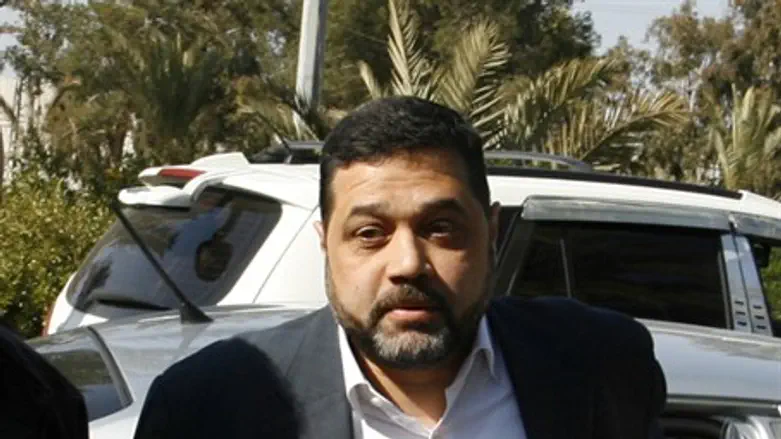
Osama Hamdan, a senior leader of the Hamas terrorist organization, said on Saturday that Turkey had kept his group updated on rapprochement talks with Israel before news of the negotiations was reported just over a week ago.
Speaking to the Hamas paper Palestine, Hamdan said, "we have a principled position that we stick to - we oppose any element of normalization with the Zionist entity, and view normalization with the Zionist entity as a process that does not serve the Palestinian problem."
The senior figure said that at the same time, Hamas is holding visits with Arab states in "an attempt to find (a way to advance) the interests of the Palestinian nation," and for that reason Hamas politburo chief Khaled Mashal has been traveling to several states, including Turkey a week ago.
"On the matter of the Turkish-Israeli agreement...we always aspire for there to be an effort that will serve the interest of the Palestinian issue and will support the Palestinian issue," said Hamdan.
"I will say honestly that in this matter we were updated on the management of the negotiation, we expressed our position and defined our position regarding what we think can serve the Palestinian issue, and we hope that the Turkish side will take care of it in a clear manner within the negotiations."
Prime Minister Binyamin Netanyahu last Monday during a Likud faction meeting declared that Israel will not ease the naval blockade on Gaza, which is meant to stop the influx of weapons to Hamas, and the removal of which has been a Turkish condition for normalization.
However, Turkish Prime Minister Ahmet Davutoglu stated Tuesday that Turkey intends to remain firm in its demand to remove the naval blockade, and also will press its demand for compensation for the Islamist extremists wounded while attacking IDF soldiers in the 2010 Mavi Marmara flotilla incident.
A fair deal?
Davutoglu also said that Turkey is only interested in the normalization talks so as to "benefit...Palestine and Gaza."
Turkish defense sources revealed last Thursday that Turkey is primarily interested in rapprochement so as to buy Israeli military hardware, with Ankara interested in buying more advanced Israeli drones as well as reconnaissance and surveillance systems for its fighter jets.
Senior Israeli security sources on Tuesday said they doubt Turkey is serious about rapprochement, noting on the crisis in ties with Russia - a key gas supplier for Turkey - that apparently prompted the desire for natural gas trade with Israel.
They also noted that Ankara still is hosting Hamas terrorists, including those who were expelled in the 2011 Gilad Shalit deal that saw 1,027 terrorists go free. The terrorists being allowed to stay in Turkey include those who are involved in planning terror attacks against Israeli citizens inside the Jewish state.
Bilateral ties broke down in 2010 amid the Mavi Marmara incident, when IDF soldiers were forced to board the Turkish ship that had ignored repeated warnings to stop its attempt to breach the maritime blockade on Gaza - a blockade that is legal under international law.
The soldiers were brutally attacked by IHH Islamist extremists on board wielding knives and metal bars, and had no choice but to open fire, killing ten of the IHH members on board. After an investigation, Israeli authorities discovered the vessel to be carrying no humanitarian aid, despite the flotilla's claims that it was on a "humanitarian" mission.